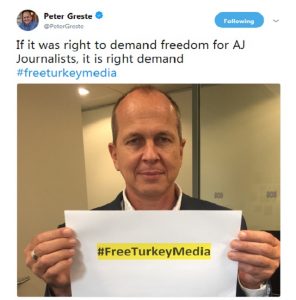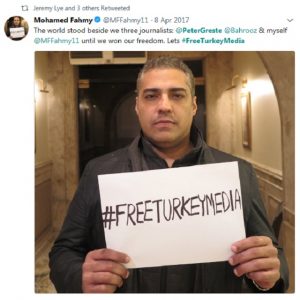“When governments criminalise journalism, we need to push back”: Peter Greste, Mohamed Fahmy and Sue Turton Interview
Interviews, New in Ceasefire - Posted on Thursday, May 3, 2018 16:49 - 0 Comments

In late 2013, three journalists working for Al Jazeera English, Peter Greste, Mohamed Fahmy and Baher Mohamed, were arrested by Egyptian authorities. They were charged with associating with Egypt’s Muslim Brotherhood, designated a ‘terrorist’ organisation, and ‘conspiring to overthrow the state’.
After more than 400 days behind bars they were finally released, thanks in large part to the #FreeAJStaff campaign.
As we mark World Press Freedom Day, I spoke to Peter Greste, Mohamed Fahmy and journalist Sue Turton — the force behind the #FreeAJStaff campaign. They explain why international solidarity was so vital to their campaign and offer their thoughts on how best to campaign to free jailed journalists in Turkey: the world’s biggest jailer of journalists for a second year in a row.

Peter Greste
Now, more than ever, we need to stand together in solidarity with colleagues who are in trouble – especially those imprisoned for their work. In these times, nobody is working in isolation; what a government does to one, it does to all. And if there is one thing we need to take away from the emerging tendency of governments to lock up journalists, it is that it could happen to any of us.
Certainly those in Turkey and Egypt are more vulnerable, but when governments around the world are passing laws that criminalize legitimate journalism, we need to push back. I am utterly convinced that my two colleagues and I would still be in prison if our colleagues had not lined up behind us in such extraordinary numbers, making it impossible for the government to resist the pressure.
And while I realize it is incredibly difficult to keep the same level of pressure for every journalist behind bars, we need to keep up the solidarity if we are to reverse or at least halt this deeply troubling trend.
I think there were a lot of unique factors that worked for us in the #FreeAJStaff campaign. The fact that Fahmy, Baher and I had worked for such a wide range of international news agencies and in so many parts of the world, meant that we had friends everywhere who knew us and identified with what we were going through. We were also lucky that we had Al Jazeera behind us, with all its resources. And we were lucky that our families were such passionate, articulate advocates. It’s not always that things work out so well.
Perhaps most importantly of all, we were able to make our case emblematic of a much wider cause – that of media freedom not just in Egypt but everywhere. If we can do that with Turkey, we’ve got a chance of winning the battle.
I think the key is to keep it simple, keep it human and keep it principled. We need to keep constantly reminding audiences, politicians, diplomats and above all, the Turkish government, that the best way to have a healthy society is by having a free press with a robust flow of ideas and information. It isn’t always pretty or edifying, but it is fundamental to good government and while it isn’t easy to have a free press, ultimately locking up journalists and stifling the media is going to be destructive. In the meantime, we need to hold together as an industry, because if we don’t, we will all wind up in trouble.

Mohamed Fahmy
During my incarceration and even in solitary confinement news of global vigils, petitions, and articles written about our unjust incarceration slipped in through the grapevine of the prison and it kept my morale up, and made me realize sitting of the floor of my dingy cold cell that I was not just fighting for my own freedom.
It is support that in a way saved my life and gave my plight more meaning—the why—a struggle to champion the fundamental right of freedom of expression. The unprecedented global support also sent a message to our captors that the world is watching closely.
The support I received during my incarceration in Egypt inspired me to become a human rights advocate and I think the world should support the innocent journalists of the Cummhuriyet newspaper in Turkey who have been ill-treated and sentenced on baseless terrorism charges in what seems to be the most vicious attack on press freedom in a generation.
#FreeAJStaff captured the imagination of the world because it was both a grass-root movement and a corporately sponsored campaign. Amnesty has engraved the plight of dozens of unjustly jailed Turkish journalists by promoting the #FreeTurkeyMedia campaign—a movement that will surely save lives and keep the jailers under the microscope if we continue to support it.
Sue Turton
When Peter, Baher and Mohamed were convicted in Egypt we knew our best weapon was the solidarity of the media all over the world. Accusing journalists of aiding terrorists because they don’t tow the regime’s line is the first step to a totalitarian state hence our slogan ‘Journalism Is Not Terrorism’.
Peter Greste’s colleagues in Kenya came up with the zipped lips image and the #FreeAJStaff campaign was born. But to get it to go viral we needed other journalists to trust that we were all innocent of the charges and just doing our jobs. A huge amount of work was done behind the scenes to get that message out to our colleagues in other organisations. Once they were on board we were up and running and the campaign soon went viral.
Journalists in Turkey are now suffering the same attack on their profession with an all too familiar crackdown. To get their plight out into the wider world we need to tell their individual stories, to publicise their work and to call out the Turkish authorities for silencing the messenger. In Turkey, as in Egypt, #JournalismIsNotTerrorism.
Read also: Peter Greste and Mohaned Fahmy: Turkey’s journalists are under siege. You can help them like you helped us.



Leave a Reply